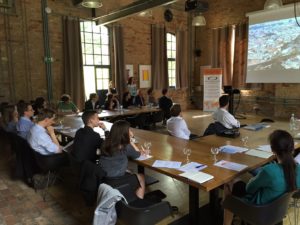Legislative support for the Energiewende which includes greenhouse gas (GHG) reductions of 80–95% by 2050 (relative to 1990), and a renewable energy target of 60% by 2050, was passed by the German government in 2010. In this context the first Young Energy Forum organised by the German member committee of the World Energy Council, brought together young energy professionals for open discussions.
The event, ‘Cost and benefit of Energy Transition: What has to be paid by future generations and will the investment ever pay-off’, took place at the EUREF Campus on 3 June in Berlin, and was organised in the form of an interactive workshop, which enabled participants to leave with tangible take-aways from the discussions.
The participants noted that the costs and benefits of ongoing development are unevenly distributed which will lead to major changes in the German energy market, particularly, the power sector in coming years. They also noted that new types of businesses are emerging and are standing relatively strong while traditional utilities are late to re-frame their business models.
The whole event was placed under Chatham House rules, allowing for issue-guided debates. This worked really well, as it allowed for open dialogue.
Christoph Menzel, Project Manager, Scenarios, at the World Energy Council said:
“Despite the broader view on the German energy transition, the composition of the audience - with a huge variety from fossil fuel related companies and federations, technology suppliers, utilities, politicians, energy intensive industries as well as researchers, helped to widen the perspectives of every attendee and provided a comprehensive platform for knowledge exchange.
“I absolutely enjoyed the insights from the panels, which gave participants innovative views from federal government as well as from a broader range of different industries, not only energy companies.”
Niels Pollmann, Coordinator of the World Energy Council’s Austrian Young Energy Professionals Programme, also attended the event and said:
“Speaking from the perspective of the Austrian member committee, it has first and foremost been a great opportunity to get to know our German partners and to see how they organise their events. The event not only served as an inspiration for our own programme but we also agreed to deepen our cooperation in the future and engage in further information exchange.”
DI Daniel Nauschnegg, Manager of Energietechnik Nauschnegg, Austria, who spoke at the event said:
“The first Young Energy Forum in Berlin was a successful event. The diverse backgrounds of the participants, was especially beneficial. The discussions between political, industrial and private stakeholders made for a great experience and an excellent exchange of knowledge and information. In this context, my talk aimed to contribute a perspective with a special focus on today’s possibilities and future potentials in the private sector. These scenarios for the energy supply of households are a key driver of our business.
“On a personal level, the event was not only an exciting challenge but also a great opportunity to see the bigger picture on a national and international level. The insights into political considerations and the industry’s answers to ongoing problems broadened my perspective in this regard. Finally, I would like to express my gratitude to the organisers and also my hope that there will be a second Young Energy Forum soon – maybe even in Austria.”
The German Young Energy Professionals Programme, which forms the basis of the German National Future Energy Leaders, was established by young people for young professionals from the energy sector between the ages of 25 and 35 at the World Energy Congress 2007 in Rome, and aims to:
- Facilitate fact-based knowledge on energy and economy related topics
- Address young decision makers and opinion leaders as well as young professionals from the energy sector
- Build a comprehensive network
- Facilitate the exchange of knowledge and experience
- Support the international activities of the World Energy Council






